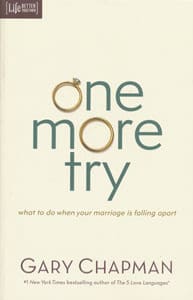Excerpt:
Dr. Gary Chapman: I never asked people, do you want to work on the marriage? Because that’s a desire, you know, that’s an emotion. And they don’t want to work on the marriage many of them, they don’t have the energy to work on marriage.
Jim Daly: Right.
Dr. Chapman: So, I don’t, I don’t ever ask, do you want to work on the marriage? I asked, will you, are you willing to work with me or work with any other counselor? You know, are you willing to work on the marriage? Because if you’re willing, then there’s real hope.
End of Excerpt
John Fuller: Dr. Gary Chapman talking about struggling marriages and how he advises couples who are really facing some difficult times. That was from our last Focus on the Family broadcast and Dr. Chapman is back with us, offering some hope and encouragement for those who are in conflict or perhaps just apathetic. They’re desperate about their relationship. Our host is Focus president and author Jim Daly, and I’m John Fuller.
Jim: John, last time we talked about those difficult kind of, uh, moments in a marriage where one or both spouses are starting to feel like maybe we’ve made a mistake or maybe we’re in trouble here and we don’t know what to do. If you didn’t hear the program from last time, get a copy of that. Especially if you’re experiencing difficulty in your marriage, you know, here on Focus on the Family that’s one of the core things that we’re about is, uh, marriage and helping marriages be as strong as they can, especially for the Christian community to know what we have in Christ in our marriage relationships. Uh, but John, sometimes that doesn’t work out well even for the Christians. Let me read a comment that came into Focus on the Family not long ago, that broke my heart. Um, this woman wrote in and said, my husband of 16 years walked out of our house a month ago and told me he is in love with another woman he met on an online dating service. This is something that is coming more and more often into Focus on the Family. These kinds of difficulties, where the marriages are just breaking up. Here’s another one, my husband did not share with me what was going on in his life. He basically lived his life and I live mine. I didn’t like it, but I didn’t know what to do about it. One day he came home and told me he was leaving. I couldn’t believe it. I had no idea that it was that bad. Um, Dr. Chapman, welcome back to Focus on the Family. And, uh, when you hear these comments, this isn’t new territory for you, either. These are the kinds of things that you deal with day in and day out.
Dr. Chapman: You’re right Jim. And I would say this, uh, when a man comes home and says to his wife, I don’t love you anymore, or I’m moving out, 99% of the time he is already involved with someone else. And he may never have said anything about it. She may be totally unaware of it, but most men don’t move out unless they are least emotionally involved with someone else. And is devastating to the wife. Or if it’s the wife who’s moving out, it’s devastating to the husband. Now, many wives move out when they’re not involved with someone else, they move out because the pressure is so strong. It’s been so painful to them that they’re moving out to get breathing room from the pressure that they’re under.
Jim: Survival.
Dr. Chapman: Survival that they have been living with. But for men, most of them are not moving out unless they’re already involved with someone else.
Jim: Hmmm.
John: Well, you’re hearing from the heart and wisdom and experience of a very trusted pastor counselors, speaker, author, and a favorite guest here at Focus on the Family, Dr. Gary Chapman. And, uh, we’re talking about what to do when you think it’s over. And, uh, much of the advice you’ll hear today comes from his book, One More Try: What to Do When Your Marriage Is Falling Apart.
Jim: Gary, of course, welcome back. But one of the most common reasons you just given it there is that affair, uh, talk about what happens when an affair takes place. What is going on typically? What is the pain being felt by both spouses and what needs to be done?
Dr. Chapman: Well, most of the time an affair is preceded by an empty relationship.
Jim: So they’re filling a void.
Dr. Chapman: Yes. So then one of them meet someone else. They get what I call the tingles, which leads them to what we typically could call falling in love. And so, they have now these euphoric feelings with this new person and the marriage is just been painful or adversarial. So, they’re comparing a new relationship with the reality of the pain they’ve been in. And they often will feel like I’ve found my soulmate this time. It’s gonna be wonderful this time.
Jim: ‘Cause it’s like the tingles they got the first time.
Dr. Chapman: Yes, absolutely. Uh, in terms of reconciliation, which is always the biblical ideal, no matter what’s happened in a marriage, the biblical pattern is to seek reconciliation, but there can be no reconciliation until a person who has an affair is willing to break off that affair and re-engage in the relationship. And a spouse should never simply accept the fact that their spouse is involved with someone else and remain in the marriage as though everything is all right, because that’s living a lie. Everything’s not all right, they have violated the covenant that was made. And so, we shouldn’t try to cover up for them. We shouldn’t try to accept it. We should confront them with it. Let them know that if this is their choice, if this is what they ultimately decide to do, then the marriage has to be over.
Jim: Can I ask you a question? I, I’ve never asked this question. Why do you think God although the scripture is clear, He hates divorce and He, I believe applauds and smiles, even in the case of infidelity, when a couple can reconcile and come back together, I think He appreciates and that couple for that hard work. But why do you think He does make an exception there in scripture to say for this reason divorce is allowable, when it comes to an affair?
Dr. Chapman: I think Jim, because the sexual part of the marriage relationship is so much at the heart of our relationship. It’s not just a physical act. It involves the emotions; it involves the intellect. It’s a social thing. It’s a spiritual thing. It is a bonding experience. And I think God reserved it for marriage because it is designed to be there, the bonding experience. And when they break the bond and have that kind of intimacy with someone else, it is devastating. And the covenant has been broken because we made a covenant that we would keep ourselves for each other. It doesn’t mean, as you said earlier, that if a person has an affair and is involved sexually with someone else that the marriage is over. Not necessarily. Because they may wake up, they may come to recognize that what I’m doing is sinful. What I’m doing is not right, it’s gonna hurt me. It’s gonna hurt my children. It’s gonna hurt my wife. It’s gonna hurt the Christian calls and they can turn back. That’s what we always hope for. That’s what we always pray for is that they will turn away from, uh, people ask me, what do you do if they’re already involved in affair, there’s only one right thing to do with an affair, you break it off. And I don’t, I don’t propose that’s easy to do. It’s not easy to break off an affair because you feel so euphoric in that new relationship. But Jim, I’ve never met a man or woman who ever regretted doing right, but they’re in my office and other counselors offices every week who did wrong five years ago, got involved with someone else, left their spouse. Now in this second or third marriage, they’re coming in to get help because now they’re having problems.
Jim: Gary, I want to go back for a minute about the person who is in that lie, living the lie of the affair. We talked about the tingles. That sounds like immaturity if I can be that blunt, it sounds like they’re living in perpetual romance and they just want to be there. It’s not the real world. It’s not where marriage is developed and relationship is forged and lifelong commitment is made and you know, people have made mistakes. And I hear you clearly on that, but in our inability to mature as Christians. And to understand that in essence, are we just stunted in our growth? Is that why there’s so many affairs going on in the Christian community and churches, pastors who are failing is because we’re not mature. We don’t understand what marriage is really about.
Dr. Chapman: I think there’s certainly a part of it Jim, you know, this whole thing of happiness has pervaded our society so that so many people have the idea and they’ve even said to me, well, I know what the Bible says, but I wanna be happy. And I think God wants me to be happy, you know? And so, they think this new relationship is gonna make them happy. And happiness is more important than what God has said. I mean, those of us on the outside, looking at them are saying, how stupid can they be? You know, it just appears totally irrational to us, but they are so intent on being happy. And they’ve likely been unhappy in the relationship in the marriage. And so, happiness trumps everything else.
Jim: Including God’s word.
Dr. Chapman: Including God’s word. And- and the reality is however that, that happiness is not materialized.
Jim: Okay, let’s talk to the couple who’s in that spot and what do they do? Uh, maybe one of the spouses they’re not willing, what can they do right now today and they’re gonna go home and they’re gonna begin a healthy confrontation in this regard, what do they need to do?
Dr. Chapman: Well, I think if one is involved in a relationship outside the marriage and is still living at home in the marriage, the spouse needs to confront them. I know what’s going on, here’s what’s going on. And if they deny which typically that’s the first response they deny, oh no, no, it’s just a friendship, nothing really going on here. Uh, then you press the issue. You make sure you’ve got the facts straight. And when the facts are straight, you tell them, I know what’s going on. Here’s the evidence it’s going on, now they have a choice. They either move out or they break off the affair and you have that line. That doesn’t mean you’re giving up on them, but you’re holding them accountable for what they’re doing?
Jim: And do they have hours to make that decision a couple of days, what do you do? What kinda timeline?
Dr. Chapman: I would say, I would say at the most a week, give them a week to think about what they’re doing. Then you pray for them. If they move out, you pray for them that God will work in their hearts, that God will open their eyes. You treat them with kindness. Remember the Matthew 18 passage says you confront them three times. If they don’t repent, you treat them as a pagan. What do you do for pagans? You pray for pagans. You love pagans. If there’s anything you can do for them, you do it. You don’t retaliate. You don’t try to get revenge on them. One man said, you know, I went over to her house. She left me. I went over to her house where she was living with another man. I took a knife and I just chopped all of her tires. And I said, “You know, you can go to jail for that.” You know, retaliation is not the answer it’s returning good for evil. I remember the wife, Jim, who said to me, my husband left me, he was living with another woman. It’d been about three months now. I’ve been praying for him. And she said, “One morning, God impressed on me that I should bake him a pie and take it over there and give it to him.” And I said, “God, if I bake a pie and take it over there, I’ll throw it in his face.” And she said, “I wrestled with it for three or four days. And God just kept telling me that’s what I needed to do.” She said, “I baked the pie. I took it to his apartment, and he came to the door and I said, I was praying the other day and God impressed on me that I should bring you a pie.” And he said, “Well, that’s very nice.” He opened the door and took the pie, turned and closed the door in her face. She said, but Gary, that was the first step in our two-year process of reconciliation.
Jim: It started there.
Dr. Chapman: Started there. She said, I hate to think what would have happened if I hadn’t make the pie.
Jim: Yeah, that’s amazing.
John: Well, maybe you were in that kind of a situation. Uh, you just can’t see down the road. There’s no hope well Focus on the Family is here to help you. And if we can be of assistance in any way, give us a call. We have caring Christian counselors on staff, and you can arrange a free consultation time with them. The details are at focusonthefamily.com/broadcast. Let’s resume that conversation now with Dr. Gary Chapman.
Jim: You know, so often today in the church, we don’t do very strong discipline in the area of marriage. And it’s weakening the whole argument for marriage, frankly, the fact that we’re not living it well in the Christian community, weakens our argument in the public square, defending marriage, and, uh, it all connects. And sometimes we fail to understand that, but Gary, I wanna keep it a personal level. You know, down to the person who’s really struggling, a person who is in that place, feeling like it’s unchangeable, how did they, metamorphize into, uh, a new thought pattern, uh, where you move from I never should have married him or her to, okay. I’ve gotta wake up today, take one day at a time. And I want to do all I can do today to do my part, to make my marriage as strong as it can be. How does a person emotionally move from A to B? ‘Cause that’s a big journey. That’s a big step. How do you do it?
Dr. Chapman: Well, it is a big step. What I would say is that one of the steps is that you acknowledge to yourself that your marriage is in serious trouble. You verbalize it to yourself, and then you make a decision, I am going to do something about this. I think you invite your spouse to join you. You say to them, “You know, I don’t know how you feel about our relationship, but I’m pretty much at a breaking point in our relationship. And I’ve decided that I am going for counseling. And I would like for you to go with me. But if you don’t, I’m gonna go alone because I’ve got to have help.” And now you have given them a possible step that they can take to join you. But if they don’t, you go alone because you need help and let the counselor or the pastor whomever, you’re going to see, let them help you know, what the next step should be. And chances are, they’re gonna give you some books to read that will challenge your thinking, they will give you some ideas on what you need to be doing. But you’re gonna be proactive in trying to do something that has the potential of reconciling the relationship.
Jim: The woman who took the pie to her estranged husband in that moment, um, and he says, thank you, takes the pie and closes the door in her face. Many people would crumble at that point. I admire her resilience that she stuck with it in two years of, uh, process, they were still married. I think half the people just to use a hypothetical percentage would crumble at that point and say, it’s over and begin to emotionally detach in order to protect themselves.
Dr. Chapman: Yeah.
Jim: Um, talk about that aspect of it. How do you fight the natural human appetite to emotionally detach because you can read the writing on the wall and you don’t stay in there fighting, and you don’t stay close to the Lord, perhaps because those are all mechanisms that you use to back up when you should be pressing in.
Dr. Chapman: Yeah. I think that is a typical pattern. And one other step that often comes is after they emotionally detach, they start dating someone else. They say, well, this is over. And so, they connect with an old friend and now they get an affair going at least emotionally. And then here’s what I’ve seen oftentimes the person who left realize it’s their fault. And they come back now and wanna work on the marriage. But now this person’s already involved with somebody else. So, what I’m saying is, and I make this very clear in the book; don’t date while you’re separated, you’re gonna work at reconciliation. I will, I say, give yourself at least a year to work on reconciliation. Now, obviously, if your spouse chooses divorce and the divorce comes and they remarry, then there’s no hope for reconciliation, but until they remarry, there’s always hope for reconciliation. And we must keep walking that road.
Jim: Uh, Gary, we also need to talk about the issue of abuse because that happens. And we haven’t touched on that last time or this time, talk to the spouse that is living in that nightmare. And perhaps she doesn’t have anywhere to turn. Um, maybe her husband is a- a lofted Christian figure who knows. And you know, there’s this abuse going on, what does she do to, uh, begin to bring reality into the relationship?
Dr. Chapman: Well, you know, often Jim, when a spouse comes and it’s usually the wife who’s being abused, not always, but almost always.
Jim: Mm-hmm (affirmative).
Dr. Chapman: Many times, she’s put up with abuse for such a long time that she’s come almost to accept it as the norm. But then she gets to the place where she realizes this is way out of line and she wants to do something. She doesn’t exactly know what to do. And she may not have the emotional energy to do it by that time. And she might feel like I don’t have the finances to leave him.
Jim: She’s feeling trapped.
Dr. Chapman: Yeah, she feels trapped. So, she stays in it until eventually, you know, something worse happens. And so many times it’s homicide. So, what I would say to that person, what I would say first of all, about abuse in a young marriage, the first time there’s an abuse that’s the time you go for counseling. The first time he slaps you, you say to him, that’s not appropriate. I will not be a part of this. I’m gonna go see a counselor. I hope you’ll go with me. Otherwise, I’m not gonna put up with this early on is the time to really confront it. But most of the time, we, it’s a long time into the abuse before we confront it. But at any rate, when we do come to confront, we go for counseling and we let someone help us take those steps of tough love to say, it’s not loving for me to stay here and let this person abuse me like this, because it’s not good for them. It’s not good for me. And if they’re children, it’s certainly not good for the children to see this. So, I’m gonna take an act of tough love and with God’s help and the help of a counselor or a pastor, I’m gonna confront it. I’m not going to stay here in this situation.
Jim: Gary, that’s really helpful advice. And that you know, again, that can be a first step, someone who’s in that situation call us Focus on the Family’s here that can be a good first call to make. And we will be able to give you some advice on what second and third steps you might consider taking. Let me ask you about shame. Shame seems to hold so many people back, especially in the Christian community, again, especially related to our marriages, when things aren’t working out well, we look at what others appear to be around us and they look happy and they look like it’s working for them. And we sit in the pew on Sunday and we wonder in our own heart quietly, why are we not as happy as what they appear to be, uh, talk about the power of shame and the reason you need to fight that in order to get the help you need.
Dr. Chapman: Yeah, well, you know, Jim, it’s unfortunate that in some churches, maybe many churches, people put up a front when they’re with other Christians, because the Christian life is designed to be an honest life and open life. And that’s what the church is all about. It’s not putting up a front, it’s being real with each other. And I encourage people not just to be involved in attending church, a worship service, but be involved in the small groups in that church, whether it’s Bible fellowship or Sunday school or home groups or whatever term they use, get involved in a small group where you can share your life with each other. That’s the heart of what the church is all about. It’s being honest and open with each other so that you can help and pray for each other. And don’t feel that you have to put up a front, you can be honest and open with fellow Christians. And if it doesn’t work with one group, then get in another group because there are loving Christian people out there that can help you.
Jim: Gary, we also have to talk about the incredible, perhaps the most important aspect that we haven’t dealt with directly and that is our personal relationship with Christ.
Dr. Chapman: Yeah.
Jim: And you know where we’re at in that whole situation with the Lord and our walk with the Lord as we call it as Christians, um, how do we stay focused on him in the midst of this kind of pain, not get angry with him so often, uh, we human beings, again, we can turn our anger toward God. Why did you, uh, let me marry this guy.
Dr. Chapman: Yeah.
Jim: I mean, people will speak those things and it’s good to be honest with God, if that’s what you’re feeling in your heart, but talk about that. How do we draw closer to God in a moment when we may be really angry with him?
Dr. Chapman: Well, I do think that’s an important aspect and I’ll deal with that in the book, because I think a relationship with God is going to affect everything else we do. For example, we’re never gonna be able to love an unlovely person without the help of God. But with God’s love, we can love a spouse who’s not treating us well. You know, the whole concept of God’s love is that it’s unconditional. You don’t have to be good for God to love you. It’s unconditional. And that’s the pattern for us. We love our spouse unconditionally. It doesn’t matter what they do, whether they’re meeting our need or not meeting our needs with God’s help we can love them. And in that context, in loving them, we stimulate something inside of them that they’re more likely to respond to us.
Jim: What about the spouse that’s feeling that it’s only conditional that if I do X, Y, and Z, whatever that might be, then I get his love. But if I don’t behave this way, he doesn’t show me that love.
Dr. Chapman: Yeah.
Jim: Um, I think it, at the core, it’s very difficult for human beings to show unconditional love, even Christians.
Dr. Chapman: Yeah.
Jim: Um, how do we really get there? And if we’re missing it in our relationship, how do we recalibrate so that our spouse can feel unconditional love?
Dr. Chapman: Well, I think conditional love is not love at all. It’s manipulation. If I do this, this and this, then they’ll do this, this and this for me, that’s manipulation. You know, teenagers often manipulate parents that way, especially if they know the love language, they say, if you know my love, you know my love language, if you love me you’d buy me this, you know, try to manipulate you, you know?
Jim: (laughs), You’ve probably gotten a few letters like that.
Dr. Chapman: Yeah, spouses can do the same thing, you know, and its manipulation it’s not love. Love is looking out for the interests of the other person and you’re right. It’s not natural, what’s natural is to love the people who love us, be kind to the people who are kind to us, but with God’s help we can show unconditional love to our children, to our spouse and to other people. And in so doing, we are being an instrument of God to touch their hearts.
Jim: Hm, and, uh, you know, showing that kind of love is so hard, Gary, but it’s important. Um, today you’ve really given us some help and hope for that marriage that feels dead, you know, due to an affair or a situation of abuse, whatever it might be. And Gary you’ve reminded us that through God’s help, there is hope for marriages. And I would add obviously through, uh, leaning into Christ for that help and that hope that’s the key and your book, One More Try, uh, really gives couples a step-by-step guide on how to restore their marriage. I so appreciate Gary, you being with us. Thank you.
Dr. Chapman: Well, thank you, Jim. That’s my hope that this book will help people gain hope when they’re at the point of giving up.
John: Dr. Gary Chapman on today’s episode of Focus on the Family, and you can get a copy of his great book, One More Try, at focusonthefamily.com/broadcast.
Jim: John today’s program has highlighted what we seek to do each and every day here at Focus on The Family and that’s to come alongside hurting marriages, hurting families and give them hope and healing in Christ. We do that through a number of resources and through the caring Christian counselors we have on staff right here. We’re able to help you, whether you’re struggling, or if you just need some creative ideas on how to strengthen your marriage and get out of that rut, uh, for those who are facing bigger challenges in your marriage, let me point you toward our Hope Restored marriage intensives. This is marriage counseling for couples who are facing an extreme crisis in their marriage, and who may even feel that they’re headed for divorce and it’s successful. We check in with our couples periodically and in our two-year follow-up, we have learned that 81% of those couples, two years later are doing better and still married. In fact, one couple who attended shared this note with us. They wrote, we attended the weeklong intensive last August. At the time we were skeptical that anything could help our situation. John, how many couples are living in that place?
John: I think far too many. And it seems like they’re at that point where it’s over.
Jim: Well this person went on to write. We were already separated, and divorce papers had been served. It was our last-ditch effort, we attended every day, but we were nervous about what you were going to ask of us. And after each day we would sit and talk and pray that the Lord would give us guidance. After a week of talking for hours about our marriage and our relationship, we decided to drop the divorce and last Christmas we celebrated 26 years together, thanks to you. We believe in miracles.
John: Oh, my what a story, that’s tremendous.
Jim: I love that we’re part of the Lord’s work through efforts like Hope Restored. And to you, our friends who give to Focus on the Family, through your prayers and financial sacrifice, you’re part of it too. We simply couldn’t do it without you. So, help us continue to stand strong for marriage and to provide the help that these desperate couples need. When you pledge a monthly gift today, and no amount is too small, we’ll send you a copy of Dr. Chapman’s great book, One More Try as our way of saying thank you. Of course, if you cannot commit to a monthly pledge, we get that. We’ll send it to you for a one-time gift as well.
John: You can donate to and get your copy of One More Try by Dr. Gary Chapman at focusonthefamily.com/broadcast or call 800, the letter A and the word FAMILY. (800) 232-6459. Well, next time, be sure to join us as you’ll be challenged to ask yourself if you’re ready to let go of control and let your kids grow up.
Teaser:
Dr. Ken Wilgus: And they really want to know, when are you going to be out of this part of my life? So, the school management thing, uh, you know, when are you gonna stop asking me and recognize that this is up to me, all those things.






















